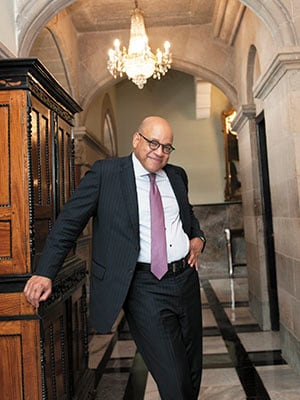
The world is not US-centric anymore: David A Thomas
David A Thomas, dean of Georgetown University's McDonough School of Business, says all MBA programmes need to be relevant globally
In an increasingly global, innovation-led entrepreneurial environment, business schools have had to transform their educational programmes to keep up with the times. David A Thomas, dean of Georgetown University’s McDonough School of Business, discusses this transformation and the challenges it poses for Indian corporations. Edited excerpts:
Q. What does it mean for a university or college to be truly global today?
There are three principles to create an effective global business education. The first is educational content. Is what we’re teaching global in its relevance? At the McDonough School of Business, that has led to a total redesign of our MBA curriculum. The second is exposure: Providing opportunities to students to interact with global business leaders, to get outside their home culture and language and understand what it means to be doing global business. In many ways, business looks the same everywhere. So what’s global? Understanding that is important. The third is the quality of the engagement that people have with each other across those differences.
Q. How has the standard management programme developed with the changing realities?
Most MBA programmes rely heavily on case studies. I have been teaching at business schools for 30 years. When I first started teaching, all the cases were about American companies doing business in the US. In our school today, more than half the cases have a global dimension to them. Just in terms of content, a lot of them have changed. Another adaptation for American business schools is that the competition has increased as business schools around the world have gotten better. The world is not US-centric anymore. The competition is no longer just between the school in New York and the one in [Washington] DC. It’s about the IIMs, Insead, London School of Business, Hong Kong University… the landscape has changed, making it more challenging for people in my job, but also a lot richer and more exciting.
Q. With startup ecosystems being developed the world over, people seem to be getting into the entrepreneurial cycle at an earlier age. How have you dealt with this?
In the last five years, we have significantly increased our offering in entrepreneurship—both in terms of classes and co-curricular activities. We have an incubator where students can apply and if we think their idea merits it, they can spend the summer there. We’re developing a fund to provide seed capital for students. For millennials, we’ve had to redesign and rethink many things in the entrepreneurial space.
Q. How have you seen Indian corporations evolve over the years?
If you went back just 15 years, Indian corporations were not seen as major global corporate leaders. They were seen as outsourcers. Today, there are Indian companies that have the attitude to not just be global players but also global leaders. Take TCS, M&M, HCL… these are all leading their sectors in a lot of ways. I have also had the opportunity to hear some Indian business leaders talk. How they speak about their ambitions is different from how they did 15 years ago. There’s an attitudinal shift. An increasing challenge for them is going to be: Can the system develop human capital to feed their ambitions quickly enough to keep pace with their opportunities? Another challenge is that Indian companies will have to become global in their orientation because they’ll have global workforces.
(This story appears in the 30 November, -0001 issue of Forbes India. To visit our Archives, click here.)






